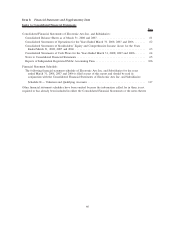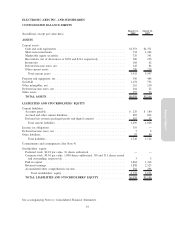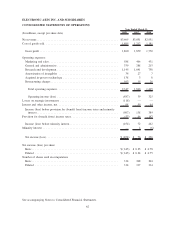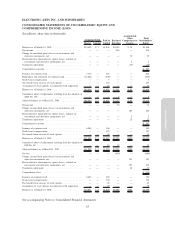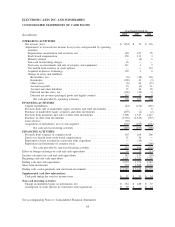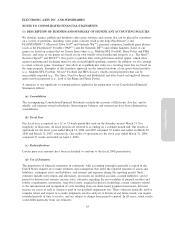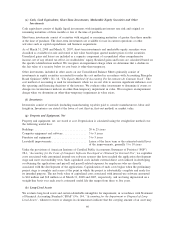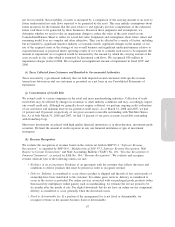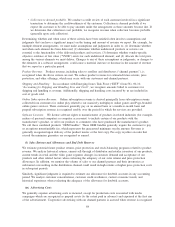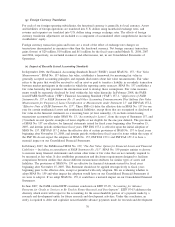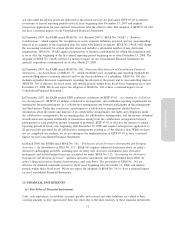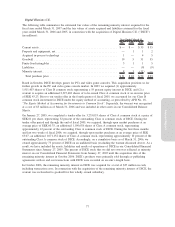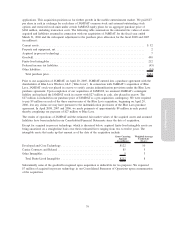Electronic Arts 2008 Annual Report Download - page 146
Download and view the complete annual report
Please find page 146 of the 2008 Electronic Arts annual report below. You can navigate through the pages in the report by either clicking on the pages listed below, or by using the keyword search tool below to find specific information within the annual report.(q) Foreign Currency Translation
For each of our foreign operating subsidiaries, the functional currency is generally its local currency. Assets
and liabilities of foreign operations are translated into U.S. dollars using month-end exchange rates, and
revenue and expenses are translated into U.S. dollars using average exchange rates. The effects of foreign
currency translation adjustments are included as a component of accumulated other comprehensive income in
stockholders’ equity.
Foreign currency transaction gains and losses are a result of the effect of exchange rate changes on
transactions denominated in currencies other than the functional currency. Net foreign currency transaction
gains (losses) of $20 million, $10 million and $(1) million for the fiscal years ended March 31, 2008, 2007
and 2006, respectively, are included in interest and other income, net, in our Consolidated Statements of
Operations.
(r) Impact of Recently Issued Accounting Standards
In September 2006, the Financial Accounting Standards Board (“FASB”) issued SFAS No. 157, “Fair Value
Measurements”. SFAS No. 157 defines fair value, establishes a framework for measuring fair value in
generally accepted accounting principles and expands disclosures about fair value measurements. Fair value
refers to the price that would be received to sell an asset or paid to transfer a liability in an orderly transaction
between market participants in the market in which the reporting entity transacts. SFAS No. 157 establishes a
fair value hierarchy that prioritizes the information used to develop those assumptions. Fair value measure-
ments would be separately disclosed by level within the fair value hierarchy. In February 2008, the FASB
issued FASB Staff Position (“FSP”) Financial Accounting Standard (“FAS”) 157-1, “Application of FASB
Statement No. 157 to FASB Statement No. 13 and Other Accounting Pronouncements That Address Fair Value
Measurements for Purposes of Lease Classification or Measurement under Statement 13” and FSP FAS 157-2,
“Effective Date of FASB Statement No. 157”. These FSPs (1) defer the effective date in SFAS No. 157 for one
year for certain nonfinancial assets and nonfinancial liabilities, except those that are recognized or disclosed at
fair value in the financial statements on a recurring basis (at least annually), (2) exclude certain leasing
transactions accounted for under SFAS No. 13, “Accounting for Leases”, from the scope of Statement 157, and
(3) include several specific examples of items eligible or not eligible for the one-year deferral. The provisions
of SFAS No. 157 are effective for financial statements issued for fiscal years beginning after November 15,
2007, and interim periods within those fiscal years. FSP FAS 157-1 is effective upon the initial adoption of
SFAS No. 157. FSP FAS 157-2 defers the effective date of certain provisions of SFAS No. 157 to fiscal years
beginning after November 15, 2008, and interim periods within those fiscal years for items within the scope of
the FSP. We do not expect the adoption of SFAS No. 157, FSP FAS 157-1 and FSP FAS 157-2 to have a
material impact on our Consolidated Financial Statements.
In February 2007, the FASB issued SFAS No. 159, “The Fair Value Option for Financial Assets and Financial
Liabilities — Including an amendment of FASB Statement No. 115”. SFAS No. 159 permits entities to choose
to measure many financial instruments and certain other items at fair value that are not currently required to
be measured at fair value. It also establishes presentation and disclosure requirements designed to facilitate
comparisons between entities that choose different measurement attributes for similar types of assets and
liabilities. The provisions of SFAS No. 159 are effective for financial statements issued for fiscal years
beginning after November 15, 2007. This Statement should not be applied retrospectively to fiscal years
beginning prior to the effective date, except as permitted with early adoption. We are evaluating whether to
adopt SFAS No. 159 and what impact the adoption would have on our Consolidated Financial Statements if
we were to adopt it. If we adopt SFAS No. 159, it could have a material impact on our Consolidated Financial
Statements.
In June 2007, the FASB ratified EITF consensus conclusion on EITF 07-03, “Accounting for Advance
Payments for Goods or Services to Be Used in Future Research and Development”. EITF 07-03 addresses the
diversity which exists with respect to the accounting for the non-refundable portion of a payment made by a
research and development entity for future research and development activities. Under this conclusion, an
entity is required to defer and capitalize non-refundable advance payments made for research and development
70


